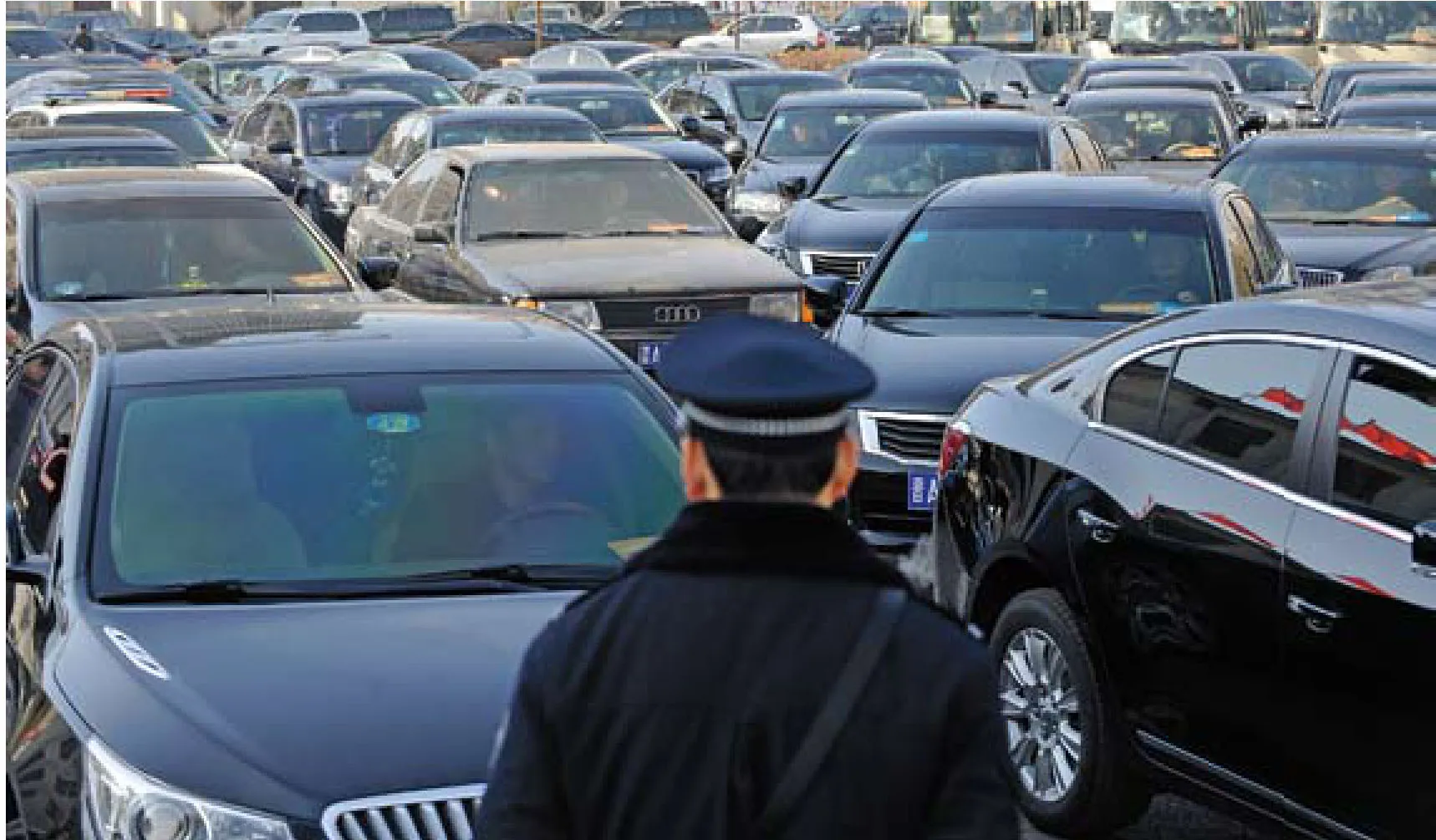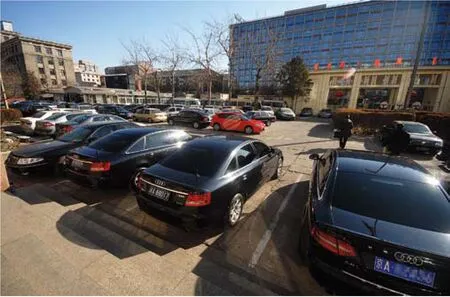A Hard Reform
2013-10-14ByYINPUMIN
By YIN PUMIN
A Hard Reform
By YIN PUMIN
New official vehicle management system is in the works
Guangzhou, capital of south China’s Guangdong Province, will further reform the use of official cars as part of its efforts to alleviate traffc jams, said the city’s traffic authorities on January 23.
T h e G u a n g z h o u M u n i c i p a l Commission of Transport is soliciting public opinions regarding measures it has proposed to ease congestion. The deadline for proposal submissions is March 5.
Offcial cars refer to ones used by government agencies, organs of the Communist Party of China (CPC), public service institutions, the military and state-owned enterprises.
According to statistics from the Ministry of Finance, the National Development and Reform Commission (NDRC) and the National Bureau of Statistics, government agencies at all levels have registered more than 2 million cars, which cost 150 billion yuan ($23.89 billion) to 200 billion yuan ($29.28 billion) each year.
The large number of offcial cars contributed to the cities’ traffic jams and the government’s unnecessary expenditure, said Wang Yukai, a professor with the Chinese Academy of Governance.
Easing pressure
In order to solve congestion problems, Beijing, with 20 million people and 4.8 million vehicles, has imposed tough congestion-tackling measures, including reducing the number of new car license plates this year to 240,000, a third the number in 2010.
It’s also stipulated no municipal government office in Beijing is allowed to purchase new cars for the next fve years.
“The impacts of official cars on Beijing’s traffc cannot be ignored,” Wang said.
According to national broadcaster CCTV, there are more than 700,000 offcial cars in Beijing, accounting for 15 percent of its total vehicles on road.
In Guangzhou, the situation is just the same.
Conservative estimates put the number of official cars in Guangzhou at nearly 200,000.
“An excessive number of official vehicles are on Guangzhou’s roads,” said Guangdong Governor Huang Huahua.
“In the past, only Party and government officials above the vice-ministerial level were allowed to use exclusive cars,” he said. “But now, many township offcials, or lower, have exclusive official cars. Many retired offcials still use offcial cars, too,”
Huang said the excessive number of offcial cars had proven problematic.
The Central Government had issued a regulation banning retired officials lower than vice governor from using exclusive publicly-funded cars, and Guangdong would soon issue a similar policy nullifying the privilege for retired vice governors and lower offcials, he said.
Huang said relevant departments will further improve offcial car management.
For a long time, China’s offcial vehicle management system has been criticized for wasting public resources, including traffc resources.
“It’s time for the government to reform its system of managing and using official cars,” said Professor Wang.
According to the NDRC, it is studying issues concerning the use of publicly funded cars and plans to further reform rules for the use of the cars. The study is conducted in response to a proposal by a democratic party on curbing the misuse of offcial cars.
In March last year, the Central Committee of the Revolutionary Committee of the Chinese Kuomintang (RCCK), one of China’s eight democratic parties, submitted a proposal at the annual session of the National Committee of the Chinese People’s Political Consultative Conference (CPPCC), the country’s top political advisory body, on reforming the use of offcial cars.
Reliable statistics show a single government car can cost up to 60,000 yuan ($8,785) a year, amounting to more than 100,000 yuan ($14,641) a year in some cases, according to the RCCK Central Committee’s proposal.
The proposal calls for canceling offcial cars for offcials below the bureau level and formulating a mechanism for recording and supervising the use of offcial cars.
It also suggests government agencies rent cars from taxi companies instead and subsidize civil servants who are not allocated the use of an offcial car.
In reply to the proposal, the NDRC said China was ready for the reform in accordance with the development of its economy, improved social transportation services and increase of private cars.
While there have been earlier efforts to reform the use of offcial cars, most of them have not been successful.
“The previous reforms made little progress,” said Pang Jianguo, an offcial with the Beijing Municipal Bureau of Supervision.
“The effectiveness of the forthcoming reform is hard to predict and giving subsi-dies to civil servants will put public fnances under pressure,” he said.
“Pervious reforms were stranded partly because the country has no specifc disciplinary procedures regarding the misuse of official cars,” the RCCK Central Committee says in an article on its offcial website, in which it suggests setting up legislation to improve the feasibility of the reform process.
“The deadlock of the reform lies in the vested interest groups, who are both benefciaries of offcial cars and decision-makers in the reform,” Wang said.
Preventing corruption
The abnormal surge in administrative costs is always related to excessive and unsupervised spending of public money on cars by offcials, said Wang.
Recently, the government of Ningxia Hui Autonomous Region, a less developed region in northwest China, was criticized for spending more than 18 million yuan ($2.64 million) on expensive cars for offcial use.
Last December, the local government procured 71 cars, including 25 Audi A6 cars. The cost of the Audi cars alone came to nearly 9 million yuan ($1.32 million).
According to regulations issued by the Central Government in 1999, cars for officials at vice-ministerial level and above should not cost more than 350,000 yuan ($51,245) each. The price of the Audi purchased by the Ningxia government is 349,800 yuan ($51,215) each, only 200 yuan ($29.28) less than the stipulated limit.
The GDP of Ningxia ranked 29th out of all the 31 mainland provinces, municipalities and autonomous regions in China in 2008 and 2009, and was far less than that of the coastal provinces.
The Political Bureau of the CPC Central Committee has listed overhaul of the offcial car management system as one of the country’s anti-corruption priorities for this year.
At a press conference held by the CPC Central Commission for Discipline Inspection on December 29 last year, the commission’s Vice Secretary Wu Yuliang said the central authorities would soon issue new and stricter regulations on cars purchased with public money.
The public spending on cars would be a key issue to be addressed by the CPC discipline watchdog in 2011, Wu said.
Wu also said the commission had made, and would continue to make, efforts to reduce the number of cars bought and used by Party and governmental organs nationwide.
A new attempt
All offcial cars in Guangzhou will be equipped with Global Positioning Systems (GPS) to curb misuse and cut unnecessary expenditure, said Su Zhijia, Secretary of the CPC Guangzhou Municipal Commission for Discipline Inspection, on January 25.
Guangzhou is the first major city to install GPS devices in offcial cars in China. The city’s Huangpu District, the Bureau of Finance and several other municipal government agencies participated in a pilot project last year.
Results of pilot projects show the cost to operate offcial cars droped 24 percent after they were equipped with GPS devices, Su said.
Su said major Party and government offcials had been required to take the lead in the campaign.
Meanwhile, a unified monitoring platform will be launched for 24-hour monitoring, he said.
“Through the platform, a car’s position can be checked at any time and shown on the map. Its travel route can also be recorded,” Su said.
The system also enables monitoring staff to talk to people in the car at any time. When a car enters a forbidden area, the system will immediately report it and all the information will be reserved as a reference.
Statistics released by the Guangzhou Bureau of Finance show the government pays up to 35,000 yuan ($5,316) annually for each offcial car, including parking fees, tolls and gasoline bills. The government also pays each offcial car driver a monthly salary of about 5,000 yuan ($732.06).
“Many offcial cars have been found to be frequently used for private purposes in the past,” said Zhang Jieming, Director of the bureau.
Local lawmakers and political advisors have applauded the move.
Qi Hai, a deputy to the Guangdong Provincial People’s Congress, said GPS devices will certainly help enhance the management of the city’s feet of cars.
“But I hope relevant departments will do more to subject official cars to public supervision,” Qi said.
He said the departments should frequently disclose the results of the GPS supervision, details on official cars being used for private purposes and the punishment of involved offcials and drivers.

CFP

IC
